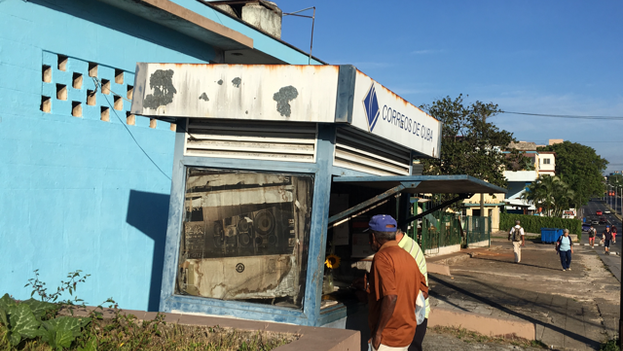
![]() 14ymedio, Havana, 9 March 2017 – The Cuban state has begun a gradual process of privatizing the sale of the official press in kiosks. Without announcing the measure in the official media, the kiosks operated by the “self-employed” have recently been authorized to engage in this activity under a “postal agent” license (which is among the 201 private occupations legalized in 2013), as reported by 14ymedio in an extensive article by Miriam Celaya this Thursday.
14ymedio, Havana, 9 March 2017 – The Cuban state has begun a gradual process of privatizing the sale of the official press in kiosks. Without announcing the measure in the official media, the kiosks operated by the “self-employed” have recently been authorized to engage in this activity under a “postal agent” license (which is among the 201 private occupations legalized in 2013), as reported by 14ymedio in an extensive article by Miriam Celaya this Thursday.
“We have five kiosks, but they are already occupied by self-employed workers,” says an employee at the Post Office located at 26th Street in Havana. The worker explains that “an interested party should locate a kiosk where they want to work and request it… Once hired, the kiosk operator should come and get the press here before eight in the morning,” she adds.
“For every newspaper I sell I earn 10 centavos in Cuban pesos (CUP) (a fraction of a cent US) and if it’s the Orbe I earn 20 centavos,” explains a kiosk operator on 26th and 41st streets. “The problem is that almost all the other publications are not available,” he complains. “Bohemia has not arrived, there is no Palante or Muchacha,” he says in relation to several missing publications.
“I get between 150 and 200 daily newspapers so I don’t earn much,” explains the self-employed operator. “This job is not to make money,” he said. The three-day course that entrepreneurs must take to occupy one of these places is “a routine thing,” he says. “Almost everything they told us was to show us where to get the papers and the details of the prices.”
For each copy of ‘Granma’, ‘Juventud Rebelde’ and ‘Trabajadores’, kiosqueros pay 19 centavos for a paper that sells at retail for 20 centavos
The self-employed woman at the Tulipan and Loma street kiosk supplies “many teachers, because they are required to have the paper but it’s not given to them.” She complains about the low profits due to the “lateness of the press.” For her, it’s important “that the publications come on time, but by the time most of them arrive they are already old news.” The woman has to go to a nearby post office to get the dailies and says, “I have to transport them myself, because most of those engaged in this work are elderly* and they can’t carry very much.”
For each copy of Granma, Juventud Rebelde and Trabajadores, the kiosk operators pay 19 centavos for a paper that sells at retail for 20 centavos (roughly one cent US). According to a calculation made by 14ymedio of the number of copies received each day or, when applicable, each week (181 Granma, 116 Juventud Rebelde, 199 Tribuna, 169 Trabajadores, in addition to the magazines: 27 Orbe and 41 Bohemia), the kiosk operators would earn about five Cuban pesos a month, if all their papers and magazines sold at the stated prices.
However, the private operators have to pay a monthly fee of 10 Cuban pesos for the license and the same for the use of the kiosk. Once these expenses are deducted, it is clear that the kiosk operators pay the state to sell the official press, not the reverse as would be normal. The self-employed are able to assume these expenses because they commonly collect more for each copy sold – in general buyers will offer one Cuban peso instead of 20 centavos** – but that is entirely up to the willingness of the buyers.
Translator’s notes:
*It is common for the elderly to informally buy a stack of papers and then walk around reselling them – providing a convenience for customers by making the papers available everywhere. They earn a little money because the customers willingly “overpay” for the papers, in exchange for the convenience and as a way to help out old people with very meager pensions.
**In this example the entrepreneur would earn a “profit” of about 3-4 cents US on each paper sold.
